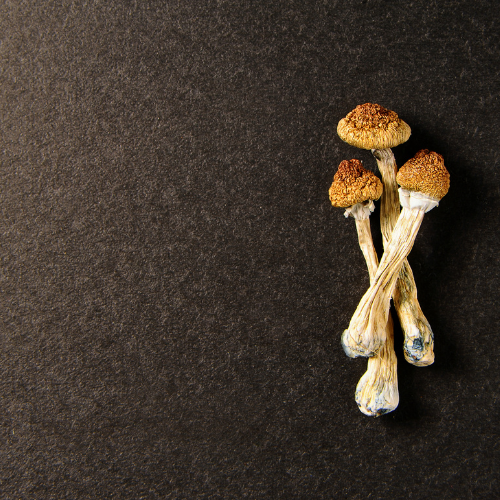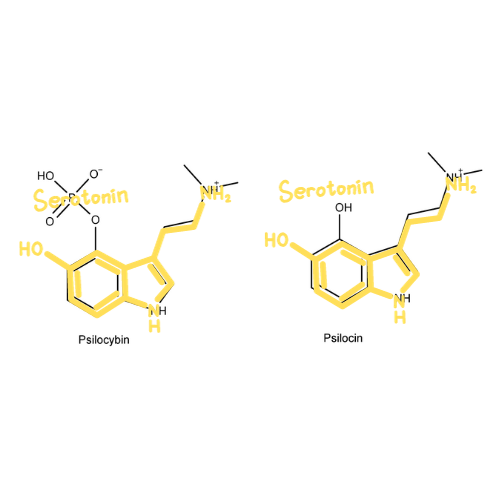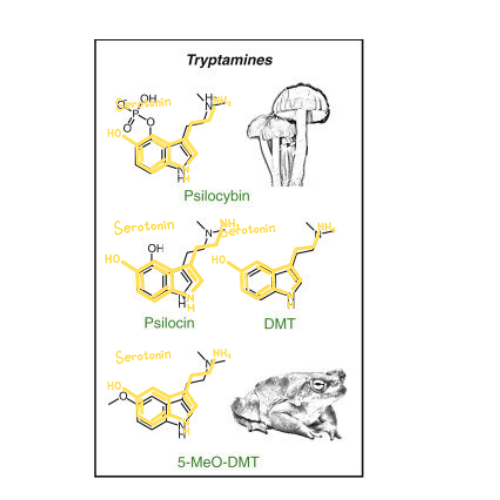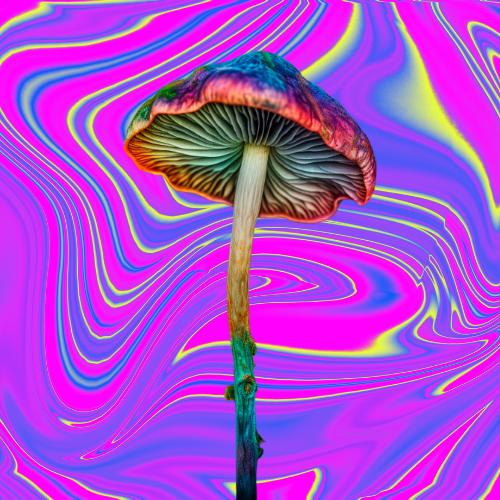Magic Mushrooms contain Psilocybin is a naturally occurring tryptamine alkaloid found in upwards of 200 species of fungi. When consumed, the body rapidly metabolises psilocybin to psilocin which activates serotonin 2A (5-HT2A) receptors and profoundly changes consciousness for 3-6 hours.
Indications on trial
- Major depressive disorder
- Treatment-resistant depression
- Anxiety and depression in cancer patients
- Depression in people with mild cognitive impairment or early Alzheimer’s disease
- Type 2 Bipolar Disorder depression
- Nicotine dependence
- Alcohol use disorder
- Substance use disorders (cocaine, opioid)
- Co-occurring depression and alcohol use disorder
- Cluster, migraine, and post-traumatic headache disorders
- Anorexia nervosa
- Obsessive compulsive disorder
- Demoralization in AIDS/HIV survivors

Effects of Magic Mushrooms
Magic mushrooms can produce a range of effects, including:
1. Changes in perception: Magic mushrooms can alter the way you perceive the world, leading to changes in visual, auditory, and tactile sensations.
2. Changes in thought: Magic mushrooms can affect the way you think, leading to profound insights, changes in perspective, and altered states of consciousness.
3. Changes in mood: Magic mushrooms can produce feelings of euphoria, joy, and well-being, as well as anxiety, fear, and paranoia.
4. Spiritual experiences: Many people report feeling a sense of connection to something greater than themselves, or a sense of unity with the universe, while under the influence of magic mushrooms.
5. Physical effects: Magic mushrooms can cause dilated pupils, increased heart rate and blood pressure, nausea, and vomiting.
To better understand the effects of magic mushrooms we need to understand the active chemical compounds present.
What are the chemical compounds in magic mushrooms?
Magic mushrooms contain a group of psychoactive compounds known as tryptamines, which include psilocybin, psilocin, baeocystin, and norbaeocystin. Psilocybin is the primary psychoactive compound that is converted into psilocin in the body, which is responsible for the characteristic hallucinogenic effects of magic mushrooms. These compounds are similar in structure to serotonin, a neurotransmitter that regulates mood, appetite, and sleep, and can bind to serotonin receptors in the brain, causing alterations in perception, mood, and thought. Other chemical compounds found in magic mushrooms include ergothioneine, ergocalciferol (vitamin D2), and other alkaloids.
What is psilocybin and psilocin?
Psilocybin is considered a prodrug, meaning it is converted into psilocin in the body, which is the primary psychoactive compound responsible for the characteristic hallucinogenic effects of magic mushrooms. Psilocybin and psilocin can bind to serotonin receptors in the brain, causing alterations in brain function and inducing a wide range of perceptual and emotional experiences.

See how the Serotonin Molecule reflects the Psilocybin and Psilocin Molecules?

What is tryptamine?

Tryptamine is a class of organic compounds that contain an indole ring structure and an amine functional group. It is a naturally occurring chemical found in a variety of plant and animal species, including in the human body where it is involved in the biosynthesis of various neurotransmitters such as serotonin, melatonin, and tryptophan. Tryptamines are known to have psychoactive effects, and some of them, such as psilocybin, DMT, and 5-MeO-DMT, are known for their potent hallucinogenic properties. Tryptamines have also been studied for their potential therapeutic applications, including in the treatment of depression, anxiety, and addiction.

How is Psilocybin being trialed?
Synthetic psilocybin is under investigation in clinical trials in the USA and Europe for several health conditions.
The FDA granted Breakthrough Therapy designations for psilocybin therapy for both treatment-resistant depression and major depressive disorder.
A Breakthrough Therapy designation can quicken regulatory approval timelines for novel therapeutics that show better performance than available medications for life-threatening conditions. Psilocybin clinical trials are ongoing with FDA marketing approval possible in 2023 or later.


